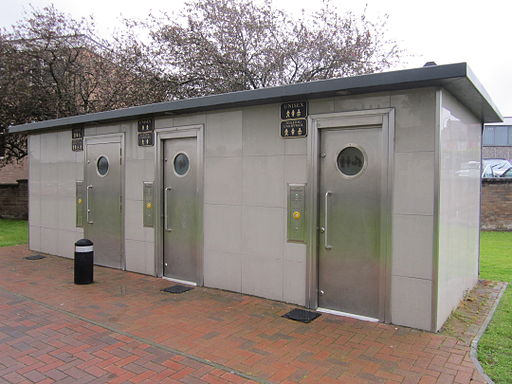Article by Philippa Watkins, National Assembly for Wales Research Service
This post is one of a series following the introduction of the Public Health (Wales) Bill on Monday 8 June. Further articles on each of the Bill’s proposals are being published throughout the week. [caption id="attachment_3959" align="alignright" width="300"] Image from Wikimedia Commons. Licenced under the Creative Commons.[/caption] The provision of adequate public toilet facilities has been identified as a priority public health issue. The Public Health (Wales) Bill aims to improve the planning of toilets for public use, and ensure facilities better meet the needs of local communities. Under the Bill, each local authority in Wales will be required to prepare and publish a local toilets strategy for its area. This must include an assessment of their community’s need for toilets (including facilities for babies and for disabled people), and must set out how the local authority proposes to meet this need. The Explanatory Memorandum states:
Image from Wikimedia Commons. Licenced under the Creative Commons.[/caption] The provision of adequate public toilet facilities has been identified as a priority public health issue. The Public Health (Wales) Bill aims to improve the planning of toilets for public use, and ensure facilities better meet the needs of local communities. Under the Bill, each local authority in Wales will be required to prepare and publish a local toilets strategy for its area. This must include an assessment of their community’s need for toilets (including facilities for babies and for disabled people), and must set out how the local authority proposes to meet this need. The Explanatory Memorandum states:
The process of preparing the local toilets strategies will enable a broader consideration of options available for providing toilets for use by the public, ranging from traditional stand-alone ‘public toilets’ through to new and creative solutions.
Strategies must be developed in consultation with local stakeholders, and will be subject to regular review. The Bill does not place a direct requirement on local authorities to provide and maintain public toilets, but requires them to ‘take a strategic view across their area on how these facilities can be provided and accessed by their local population’. Some stakeholders have argued that the duty to develop a strategy doesn’t go far enough, and would prefer to see a requirement on local authorities to actually provide adequate toilet facilities. Why is this needed? The Bill’s Explanatory Memorandum identifies a number of challenges with the current system governing public access to toilets, including:
- providing and maintaining public toilets in Wales is at the discretion of local authorities (there is no duty to provide them);
- public toilets are costly to local authorities and as a result, are under threat of closure across Wales;
- the previous Public Facilities Grant Scheme (which reimburses local authorities for payments made to local businesses for allowing free public access to their toilet facilities) was limited in that it focused purely on toilets within private establishments;
- there is poor planning around making the best use of toilets within public buildings e.g. public libraries, sports centres etc.
The public health and environmental costs of inadequate toilet facilities have been highlighted in a number of public inquiries and reports, including the Assembly’s Health and Social Care Committee’s 2012 inquiry. The Committee heard that:
- effects of inadequate provision of public toilets may include stress, isolation, depression, reduced mobility, effects on bladder and bowel function, dehydration, urinary tract infections and spread of infection;
- there may be a consequential impact on the NHS and on other services;
- the effect of declining provision of public toilets is likely to be disproportionate, affecting certain groups more than others, for example older people, those with certain health conditions, disabled people and parents or carers with young children;
- inadequate provision may also have a negative effect on strategies intended to increase walking and other outdoor pursuits, and to allow older or disabled people to remain independent and mobile.
Help the Aged’s (now Age UK) 2007 report on public toilet provision in the UK, Nowhere to go (PDF, 884KB), found that more than half of older people agreed that a lack of public toilets stopped them from going out as often as they would like.
This is an issue that has a massive impact on people’s quality of life, and the passion and tenacity with which many older people campaign on this issue in their local area are a testament to the value they place on public toilet provision.
Responding to the White Paper, local government representatives were generally opposed to the imposition of a duty to develop a strategy on toilets for public use, largely, it seems, for financial reasons. Many local authorities stated that any new duty would need to be accompanied by adequate funding, and that there may be a risk of raising public expectations beyond that which could reasonably be delivered through a local toilets strategy. The Public Health (Wales) Bill has been referred to the Health and Social Care Committee for Stage 1 consideration of the general principles of the Bill.




